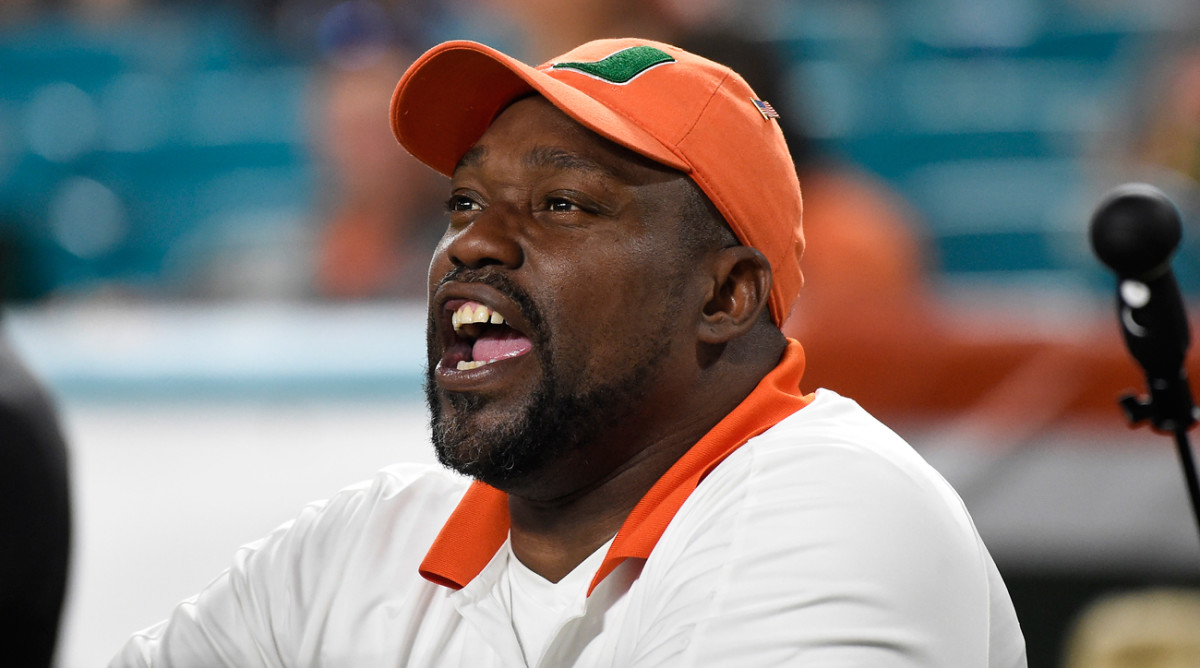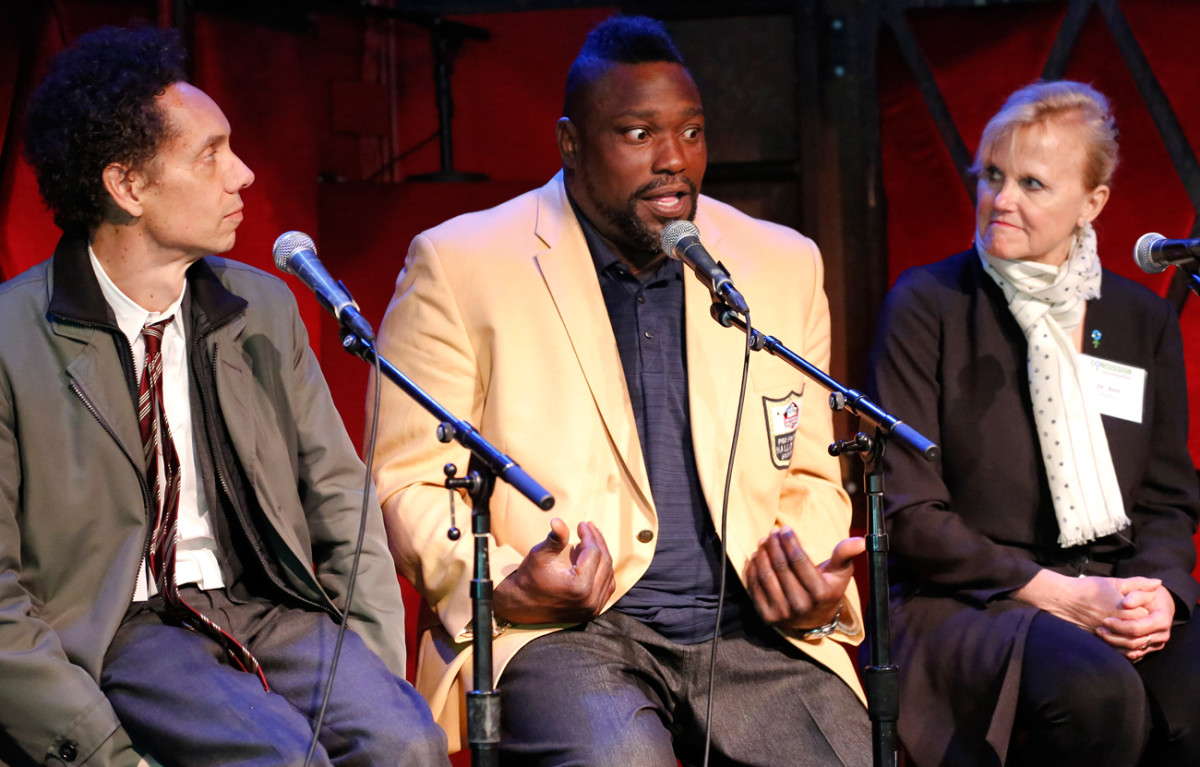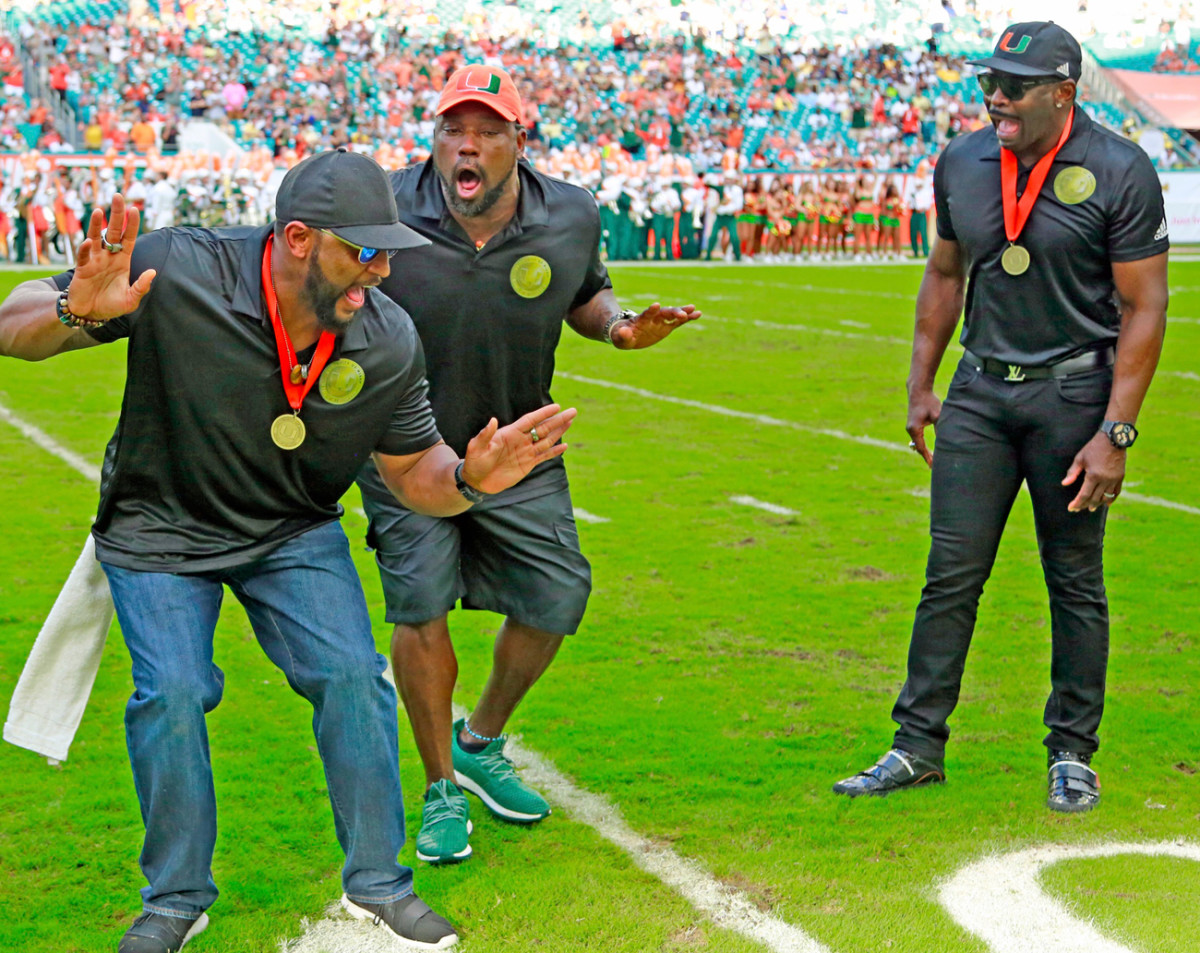Strip Clubs, CTE Talk and a CBD Sales Pitch: A Weekend Inside Warren Sapp’s World

It’s a Thursday night in South Florida, middle of October, and Warren Sapp is sidled up to the bar at a strip club watching football. The Eagles play the Panthers on a flat-screen in the corner, and a DJ pumps the room full of rap music as the Hall of Fame defensive tackle alternates between sipping on a beer and puffing on something he’s passing back and forth with a friend. The place is owned by Edgerrin James, another former Miami Hurricane, and Sapp comes here often.
A few other men mingle about, drinking, but you wouldn’t know the nature of the establishment if not for the metal poles scattered about. “Where are the girls?” I ask the bartender.
“We tell people they’re in back, changing,” the bartender says, “but [the dancers] won’t come in on Thursdays anymore.” Business is that slow.
Sapp and I order more drinks and half-watch the game as we get to know one another. Several times he makes a point of saying he can’t party like he used to. It seems to be his way of conveying that, at 44, he’s slowing down, maturing. He predicts that he won’t last beyond midnight—but then at halftime, around 10 p.m., he announces we’re relocating.
“We need to get some a-- in your face,” he says.
I had reached out to Sapp a few months earlier, around the time he was re-emerging into the public eye. Last most people had heard from him, he was being arrested and charged with assault and the solicitation of a prostitute at Super Bowl XLIX in Phoenix, in February 2015, losing his job as an NFL Network broadcaster in the process. He all but disappeared for two years—until this past summer, when he went on a mini press tour announcing that, upon his death, he would donate his brain for concussion research. If it all felt a bit orchestrated, this positive press, that notion was reinforced when he aligned himself with the esteemed CTE Center at Boston University, making appearances as a spokesman about the dangers of head trauma, asking the football-consuming public to take him seriously on perhaps the most important topic in sports today.
“Let’s get the research, let’s apply the knowledge, and let’s make [player safety] better for everybody,” Sapp implored viewers in the Players’ Tribune video in which he announced his brain donation.
I wanted to talk to Sapp about the prostitute incident, his work with the CTE Center and his unorthodox transition. And he seemed game. He invited me down to attend the Miami home tilt against Georgia Tech, during which he would be inducted into the Hurricanes’ Ring of Honor. He keeps a place in nearby Hollywood, Fla., and he said we could hang all weekend. He seemed to think it would make for a good story.
Now Sapp wants to relocate, and so he takes me to a second strip club a short drive up I-95. He leads us to a VIP entrance, and then a VIP section on the second floor, where we’re given a corner table facing the main stage. (There are zero empty poles here.) Sapp orders a vodka soda, gets me a gin and tonic, and surveys the scene. Twenty bucks for a dance, he informs me—but for $150, he says, there’s more to be had.
Sapp seems happy to have a reporter around, a platform to voice his opinions again. Earlier, in his car, he waxed poetic on current events, from the U.S. President (“You wake up now and ask, ‘Is this motherf----- going to start a war?’ ”) to VP Mike Pence (“His bible must burn up when he puts his hand on it at night”) to Colin Kaepernick (“Any time the s--- you bring [exceeds] your talent, you’re out of here”).
Our drinks arrive, and Sapp calls a girl over, offering her $100 to dance for me. He’s trying to play host, maybe curry favor. (Full disclosure: I do buy a dance, but I use my own money.) Later on I notice he hasn’t gotten a dance himself. “They’ve got hidden cameras [in the back room], I swear,” he explains. His eyes widen. “They’ll blackmail you if you’re the right person.”
The game ends just before midnight, and Sapp leads us out the door. “I told you I was going to be in bed by 12,” he says, flashing a grin.

Sapp is lounging the next afternoon on the balcony of his room at the Turnberry Isle Resort and Club, rolling a blunt. He’s got 12 bottles of champagne on ice in his room for a pool party, but right now we’re talking about concussions and CTE. His mother, Annie, is sitting on another balcony about 15 feet away; only when she leaves do I feel comfortable wading into the Phoenix prostitution incident.
Here’s how Sapp says it went down: Late on the night of Super Bowl XLIX, after he finished his broadcast work for the NFL Network, he headed to his hotel in downtown Phoenix and was going up to his room when he spotted some of his coworkers drinking at the lobby bar. “Flag one: I’m hanging out with people I don’t [typically] hang out with,” he says. “And these [women] were in their company!” (The NFL Network declined to comment.)
What happened next is the subject of some debate. Sapp outlined his version of events in a taped interview with Phoenix police, a copy of which was obtained by The MMQB. From the bar, Sapp says, he took two women up to his room, each of whom he paid $300 in cash. “Everybody got naked,” he told authorities, and he started taking pictures of the women on his bed. (To police: “I’m silly like that sometimes.”) Sapp received oral sex, which he recorded on his phone, and then he suggested to one of the women that they have intercourse, at which point that woman asked for more money. “That’s when I said, ‘This is over,’ ” Sapp told police. “I grabbed her stuff off the desk area, threw it out the door.”
In Sapp’s version of events, one of the women spat in his face as they left, and grabbed his phone from his hand. Sapp found himself naked in the hallway, trying to wrestle the device back.
The two women told police a different story. Sapp, they claimed, grabbed one them by the arm, choked her and threw her out of the room. (The police report notes bruising on her right arm and an abrasion on the left.) The women also described Sapp tackling them. In the end, Sapp took a plea deal that allowed him to avoid jail time so long as he completed a prostitution solicitation diversion program and took anger management class.
Sitting on his balcony, between hits on his blunt, Sapp denies the assault claim. “Ain’t nobody got their ass whupped,” he says. “Ain’t nobody did nothing to nobody that wasn’t consensual, f------ agreed upon and paid for.” If he did attack those women, he argues, there should be a “laundry list” of other women accusing him of assault. “The guys who beat women have been doing it since they were 18. Like, serial rapists and men who do things like [Harvey] Weinstein did. Bill Cosby. When [revelations] come out, they light up.” This, we know, is not always the case, but Sapp goes on. “If this is me, then where [are the accusations] at?”
In fact, Sapp has been accused of committing violent acts against women. Multiple times. In 2010, right before Super Bowl XLIV in Miami, he was arrested and charged with domestic battery after a woman said he choked her, pushed her down on a couch and grabbed her by her shirt and neck. (That charge was later dismissed when prosecutors found inconsistencies in the evidence and in the woman’s statements.) Then, in 2015, four months after the Phoenix incident, Sapp was charged with domestic violence against a woman in Las Vegas. She told police that he had bit her and stepped on her head. (Sapp pleaded no contest and avoided jail that time by attending six months of counseling, paying a fine and performing 48 hours of community service.)
In the Phoenix case, Sapp’s defense goes something like this: If I had hit them, you would know. “Come on,” he says. “I inflicted more damage than that on a Sunday afternoon, when [my opponents had] pads on. Give me a break. I mean, my reputation ain’t that I miss.” He cackles. “Especially when I’m coming for ya! When I’ve made the decision to whoop your a--, you’re gettin’ it.”

At dinner that night, on the balcony of an Italian steak house, Sapp is puffing on a joint again, taking in the view. He has rented out a private room and invited 10 of his friends for a meal celebrating his Ring of Honor induction. Everyone is mingling, drinking and snacking on caviar-topped pizza when the chef comes out to greet us. “There’s only one rule,” the chef says. “If you’re smoking weed, you’ve got to share it with me!” Sapp happily hands over what he’s got.
Later Sapp engages with a friend of a friend, who mentions that he runs a youth football program in Orlando, near where Sapp grew up. This Sapp does not approve of, and out comes the CTE spokesman in him. “[They] shouldn’t be playing under 14,” he says sharply. “The brain is still developing.” He sets into a stern lecture on proper tackling technique and the effectiveness of helmets, laying into the guy, who tries to explain that his league takes the proper precautions. But Sapp isn’t having it. “We found CTE in a 17-year-old,” Sapp says.
“Really? Huh.”
“A 17-year-old,” Sapp repeats, staring a hole through his guest.
“So they’re going to have to just. . . is it going to be all seven-on-seven in high school?”
Sapp: “We want to tell Riddell, take [all those] helmets that you make for seven-to-13-year-olds and [instead] build us a f------ community center where they can learn about chess, coding and all of that other s---. Let’s develop these brains, these minds that need to be f------ nourished! Let’s not hit them upside their damn heads 100 times. Do you do that to your kid, sir?”
“No,” the man stammers. “No . . . ”
“That’s what you’re doing if you send him out there. He’s taking 300-some subconcussive hits!”
Sapp knows the physical toll that football can take on a body. Throughout my visit he walks around with a bad limp that he says he developed after he retired, in 2008. “I’ll wake up and have to pop [my left hip] in place,” he says at one point. “My knee is acting funky. My quad isn’t where I want it to be.”
It doesn’t help that he now lacks the pain medications that he says team doctors supplied him with throughout his career. After the NFL Network fired him, Sapp set out to find medical relief, and eventually he focused his interests on Cannabidiol (CBD), a natural compound found in cannabis. (It’s worth noting here that Sapp tested positive for marijuana in college at least twice.) He was deep in the discovery process when he learned that Keith Gordon, a friend in the energy drink industry, was also interested in CBD. In 2016 the two men went into business (with a few partners) on Be Trū Organics, a company that sells CBD pain-relief products in cream, spray and gummy forms.
Be Trū is trying to distinguish itself in two ways. For one, its products are free of THC, the psychoactive element in cannabis, and two, Gordon tells me they can “repair and protect brain cells”— brain cells damaged by concussions. He refers me to Dr. Gerald Ballough, a LaSalle University professor who’s testing Be Trū on rats. Gordon forwards me a letter Ballough wrote, saying Be Trū “is a ‘magic wand’ that can protect brain cells and prevent them from dying.” But for more than two months, Ballough never returns calls or emails to discuss those findings.
Meanwhile, Sapp is actively pushing Be Trū’s products as one of the company’s main spokespeople. He tells anyone who’ll listen that he uses their spray twice a day—once in the morning, and again at night. He seems excited when he tells me about Ballough’s research. According to Gordon, “[Sapp has] been on the phone with the NFL I-can’t-tell-you-how-many times, saying, ‘Just let [players] try it. I’ll give it to them for free. Let’s save these people.’ ”
A few days before this story publishes, Gordon’s wife, Be Trū president Julie Wilson, calls to clarify: Ballough’s study, she says, is not finished, and Gordon and Sapp should not have discussed it with me. She says Be Trū does not advertise that its products “repair” brain cells—not yet, at least. But Be Trū’s Facebook page referenced Ballough and his “magic wand” comment dating back to May 2017.
It was in early 2017, after Be Trū was up and running, that Sapp connected with Chris Nowinski, a co-founder of the CTE Center at BU, and started discussing the possibility of working as an advocate. Their formal partnership began last May when Sapp sat on a panel in New York alongside Nowinski, Malcolm Gladwell and CTE Center director Ann McKee. A month later he shot that video with The Players’ Tribune, announcing that he’d be donating his brain to the center once he died. In September he appeared with Nowinski at the Cohen Veterans Care Summit in Washington, D.C.; and in October, one week after my visit, he sat on another panel, with Nowinski and Dr. Bennet Omalu, at Chicago Ideas Week.
As their partnership grew, Sapp started texting Nowinski weekly about upcoming talks and the latest research. On the subject of CTE, he has all of his critical talking points down. He’s a big believer now that children shouldn’t play tackle football before high school, and in casual conversations he refers to the center’s researchers in the first-person plural: We found CTE in a 17-year-old.
“He’s fantastic,” Nowinski tells me over the phone shortly after my visit with Sapp. “He’s just an amazing speaker. He’s charismatic, smart, thoughtful. . . . Every panel I’ve been on, he’s everyone’s favorite. He’s got the best lines, the best insights. He’s saying all of the right things.”
One way to view all of this: Nearly three years after the high-profile Phoenix prostitute incident, Sapp is trying to do some good, educating his fellow players about concussions. “This is my baby,” he says in Miami. “There are too many people in denial about something that is so obvious it’s sickening. I’ve always said, I want to leave the game in better shape than when I started, and I am not coaching. I am not f------ coaching. They can kiss my a--.”
Sapp sees this as all connected—his work with the CTE Center and with Be Trū—in a way that will ultimately benefit him. He mentions that McKee is working on identifying a signature to diagnose CTE in the living. “If we’ve found a signature, we can put Be Trū on it and see what happens,” he says. “I’m sittin’ on something! I’m sittin’ on something!" But it’s "not about the dollars," he tries to clarify. "It’s about helping people who are hurting like I do.”
I ask Nowinski over the phone: Does he have any hesitations about working with Sapp, given his history?
“Um. . . . ” Nowinski starts. The line goes quiet for 20 seconds.
“I feel like that’s an answer I would want to put in [an email].”

Saturday arrives. Game day against Georgia Tech. Sapp invites me to watch his Ring of Honor ceremony in a stadium suite, along with his family. At halftime there’s a short presentation with a highlight reel on the video boards. Sapp does a little dance and receives an ovation.
By the start of the second half he’s back in the suite, and he’s limping badly again from standing on the sideline. Sapp says he’s seeing a doctor the following week; he thinks he’ll need a hip replacement. “I’m hurting,” he says. “Little stiff right now.” He sends a friend to fetch him a Stella Artois.
Sapp starts working the room, patting backs, saying hellos, yelling out commentary about the game. “You good?” he calls out, turning to find me in the back of the room. “Tonight we’re going to get a steak the size of your head!” This is the Sapp from the strip club: charming, funny, easygoing, mostly. He doesn’t want me to feel left out. He lights up the room, and you can see how he made an effective broadcaster. You can see, too, why Chris Nowinski would put him on a stage with Malcolm Gladwell and Bennet Omalu.
Nowinski eventually responded to my question about Sapp’s character, writing over email: “Warren has paid his debt to society and completed counseling. As an organization working in the concussion and CTE space, we believe in opportunities for redemption. Warren has the power to make a significant positive contribution. . . . We encourage him to continue to use his platform to make a difference.”
But there was that hesitation. Even if Sapp is trying to do some good with his player safety work, it’s difficult to ignore what’s beneath the surface, the part of him threatening to undo it all. Sapp the bully. Sapp the antagonist. Sapp unhinged.
He was in the news again last month when a former NFL Network stylist named him in a sexual harassment lawsuit against the league’s media arm. She claimed Sapp had: given her sex toys as Christmas gifts, showed her nude pictures of women he said he’d slept with, and urinated in front of her while she was using a men’s restroom as a makeshift office.
Sapp went on a sports talk radio station in Miami to defend himself, acknowledging only the sex toys and denying everything else. He said the toys were novelty items, designed to look like mascara and eyeliner, and claimed that employees in the makeup department had asked for them. “Where’s the harassment at?” he asked incredulously. “I’m the notorious one. I’m always the bad guy.”
He thinks this perception is unfair, as if he were the victim. But he brings it upon himself. I saw it the morning after the strip club, at a Ring of Honor luncheon. When fans approached him for autographs without saying “please,” Sapp would stare the offenders down until they turned red in the face, fretting over what they’d possibly done to offend. “ ‘Please’—you never hear [that word] anymore,” Sapp tells me. “And then you look at [these people] like, What the f--- you asking me for? and they look at you like you’re asking for their first-born [child]. If it were Peyton Manning [they would be saying], ‘Mister Manning, would you please. . . .’ I’ve been there! I’ve heard that! I’m like, how did this turn from ‘Warren’ into ‘Mister Manning?’ You have a certain reverence for this motherf-----, but you’re going to treat me like any other n-----? I got you. Well, now I’m going to make you say ‘please.’ I’m going to make you say it, and then I’m going to leave half the autograph off.”
Back in the luxury box, we watch Miami pull off a miracle comeback against Georgia Tech, kicking the game-winning field goal with four seconds left. Everyone celebrates for a few minutes and then starts gathering their things to leave. Sapp is tired and in a hurry. He opens the suite’s door and sees a stream of fans heading past—fans who’ll surely ask for autographs and selfies with him—and he turns back. “Nah, I’ll wait,” he says.
But then a friend of a friend approaches. “Hey Warren, can I get a picture?”
Sapp’s face goes blank. He heads for the door again as the man’s friend—someone Sapp actually knows—pleads for him to do the favor. Sapp is saying no; he’s not going to do it, he’s going to leave. He tries to stay cool, but the friend is insistent, and finally my host just darts out into the stream of fans, where an usher whisks him away.
This is the last I’ll see of Sapp all weekend. Later he’ll say he’s too tired to get those steaks. But as he goes I hear him plead his case one last time.
“And he didn’t even say ‘please!’ ”
Question or comment? Email us at talkback@themmqb.com.
